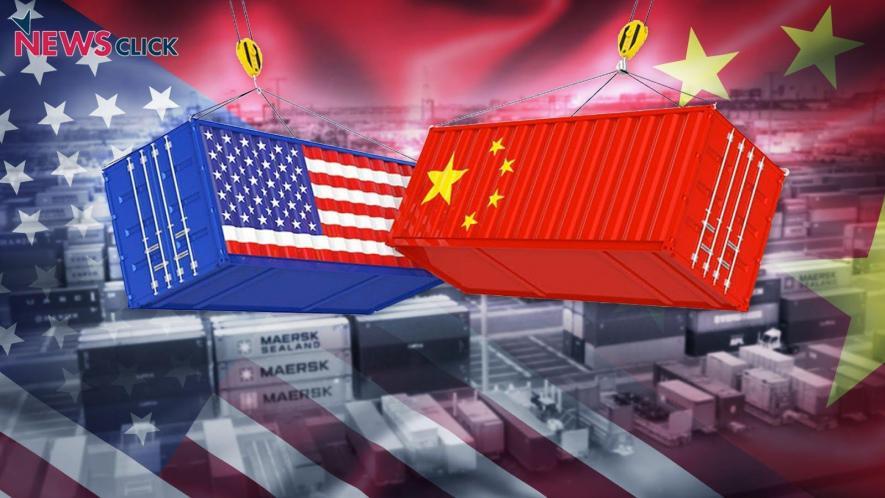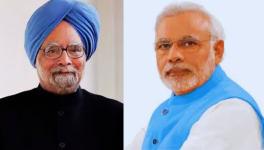Why US-led Economic Dominance is Shaking

The imperialist countries led by the US have been imposing unilateral sanctions that do not have any backing from the United Nations against countries that dare to defy their diktat. According to one estimate, almost one-third of the countries of the world have been subject to such sanctions at one time or another. Such sanctions include the freezing of those assets of the sanctioned countries that are held in Western financial institutions, as has been the case with Iran, Cuba, and North Korea among others earlier, and with Russia most recently.
Even though such freezing of assets is blatantly against the rules of the game under capitalism, and amounts to an act of international brigandage, the imperialist countries have had no hesitation in imposing it. And to rub salt into the wound, the US has recently paid the interest amount earned on Russian assets frozen on account of the Ukraine war promoted by NATO (North Atlantic Treaty Organisation), to Ukraine itself for financing the war.
In addition, while neoliberal policies are being thrust on the Global South, on the utterly specious but incessantly repeated argument that they are beneficial for it, the US itself has been adopting protectionist measures, basically to boost its domestic employment and to reduce its trade deficit.
Read Also: Trump’s Use of Tariff Wall as a Weapon
Such protectionism has been most pronouncedly directed against China; and now Donald Trump has announced that he is going to make it even more stringent when he assumes office as president. He proposes, for instance, to impose an additional 10% tariff on all imports from China on the proffered grounds that illicit imports of unwanted drugs from China to the US continue to occur despite the promise by the Chinese leadership to come down on their exports.
US imperialism, in short, believes that it can do whatever it likes, that it is a law unto itself. Whether its actions violate the capitalist rules of the game, whether they violate the very principles whose wisdom it advocates across the world, is of little consequence to it. But its unilateral imposition of will on other countries is now being seriously challenged. In fact, it is being paid back in its own coin.
Its ban on the export of semiconductor technology to China had brought about in response a ban by China on exports to the US of antimony which is used in a number of activities related to “security”; this has pushed up antimony prices in the US quite sharply.
More recently, China has dealt a major blow to the US by announcing that it will stop buying US oil altogether. China’s oil imports from the US have been coming down of late anyway. In 2023, China had imported 150.6 million barrels of oil from the US, but in 2024, these imports had dropped to 81.9 million barrels, that is, by as much as 46%. China’s position had changed from being the second largest oil importer from the US to being the sixth largest; and now it is going to stop oil imports from the US completely.
Read Also: Can the US Contain China?
China’s announcement has infuriated Donald Trump under whom the US had become the largest producer of oil and gas in the world and an exporter as well. One of the likely reasons for the blowing up of the Nord Stream gas pipeline in 2022, which US journalist Seymour Hersh believes was the work of the CIA, was to eliminate Europe’s dependence on Russian gas and to make it more dependent on supplies from the US instead; this, in fact, is exactly what has happened subsequently.
The Chinese action banning the import of American oil, therefore, goes against this US policy of finding export markets for US energy sources and of making countries import-dependent on the US for energy.
In fact, the Chinese ban on US oil is both an act of retaliation against US trade restrictions on Chinese exports, and also a means of reducing dependence on the US for its energy needs, precisely to eliminate any vulnerability to American arm-twisting in future.
What is also striking is the way China proposes to make up for the lack of oil imports from the US. The loss of imports from the US would now be made up with larger imports from Russia, Iran and Venezuela, the three countries that have been among the most important targets of American sanctions. Because of these sanctions oil from these countries is available cheap at the moment.
For China, for instance, Russian oil will work out cheaper than oil from the US, so that even while ridding itself of dependence on the US, China will also be getting cheaper oil by the new arrangements it will be entering into. By contrast, the US which had scored a major “victory” by grabbing the European market for energy, would be losing the Chinese market and leverage vis-à-vis China.
Donald Trump’s anger in this context is not surprising. Trump accuses China of waging a trade war against the US, but the reality is that China is taking steps to defend itself against the trade war launched by the US against it for quite some time.
American unilateral measures, which until now had been the means of browbeating helpless countries into toeing the line of US-led imperialism, are now giving rise to a new set of international arrangements that would loosen the economic dominance of US-led imperialism.
As long as American actions were directed against just a few small hapless countries that could be counted on one’s fingertips, such actions could be effective and the targeted countries coerced into subserving imperialist hegemony. But when such actions target a large swathe of countries, then an alternative arrangement itself begins to emerge; imperialist hegemony gets shaken if it is openly exercised against as many as one-third of the countries of the world.
Read Also: De-Dollarisation Amid Western Domination
All this has an important bearing on the role of the dollar. China’s importing energy from Russia, Iran and Venezuela, the first two of which are BRICS members and the third hopes to be a future member, entails increased trade within BRICS. Such trade will not necessarily be in US dollars; the dollar will not be the medium of circulation in exchanges among BRICS countries. Though the ultimate form of the currency arrangement among BRICS countries is still an open question, the fact that trade among them will not be dollar-denominated is clear; in fact, that was the message of the Kazan summit of BRICS countries.
The Chinese action in banning oil imports from the US will expand trade not only within BRICS but also strengthen an alternative currency arrangement that would serve to undermine the hegemonic position of the dollar. The displacement of the dollar to be sure will not happen overnight; but moves toward undermining its hegemony are clearly afoot.
This is a potentially liberating development. The neoliberal regime that holds the Global South in its stranglehold has reached a dead-end, greatly accentuating the distress of the working people there.
While there is no question of an end to the crisis of neoliberalism within neoliberalism itself, breaking out of this arrangement entails substantial transitional pain, precisely for those people whose interests demand such breaking out. This pain is both because of the spontaneous operation of neoliberalism and also because of imperialist sanctions that back up such spontaneous actions.
For instance, any country of the Global South that imposes capital controls in order to revive the autonomy of its nation-state so that it can pursue a pro-people economic agenda without fear of capital flight, will find that in the short run it can no longer cover its trade deficit, as finance will not flow into it. This would necessitate trade controls as well, which would reduce the availability of goods domestically and hence further increase the compression of demand on the working people in the period of transition.
Having an alternative trading and currency arrangement, however, can reduce this transitional pain, especially if this arrangement takes the form of the bilateral trade arrangements that the Soviet Union had in its time with many countries of the Global South. The potential for breaking out of the neoliberal regime, therefore, is increasing; and the Chinese action in making alternative oil import arrangements underscores this potential.
Prabhat Patnaik is Professor Emeritus, Centre for Economic Studies and Planning, Jawaharlal Nehru University, New Delhi. The views are personal.
Get the latest reports & analysis with people's perspective on Protests, movements & deep analytical videos, discussions of the current affairs in your Telegram app. Subscribe to NewsClick's Telegram channel & get Real-Time updates on stories, as they get published on our website.
























